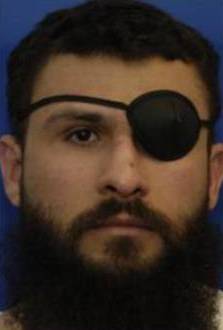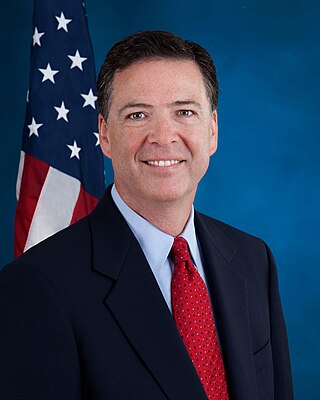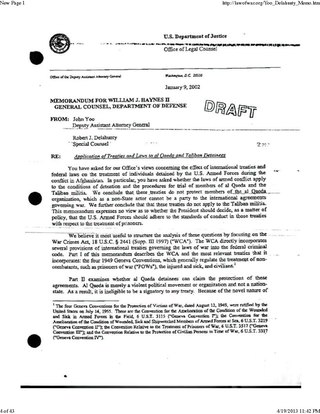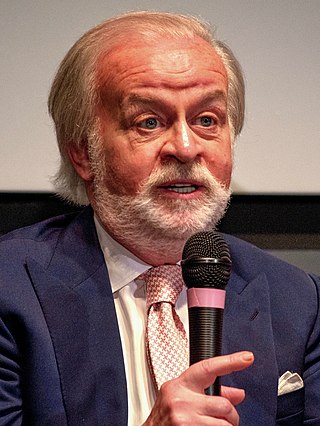Related Research Articles

Abu Zubaydah is a Palestinian citizen and alleged terrorist born in Saudi Arabia currently held by the U.S. in the Guantanamo Bay detention camp in Cuba. He is held under the authority of Authorization for Use of Military Force Against Terrorists (AUMF).

George John Tenet is an American intelligence official and academic who served as the Director of Central Intelligence (DCI) for the United States Central Intelligence Agency, as well as a Distinguished Professor in the Practice of Diplomacy at Georgetown University.

The al-Shifapharmaceutical factory in Kafouri, Khartoum North, Sudan, was constructed between 1992 and 1996 with components imported from Germany, India, Italy, Sweden, Switzerland, Thailand and the United States. It was opened on 12 July 1997 and bombed by the United States on 20 August 1998. The industrial complex was composed of four buildings. It was the largest pharmaceutical factory in Khartoum and employed over 300 workers, producing medicine both for human and veterinary use.

The National Commission on Terrorist Attacks Upon the United States, commonly known as the 9/11 Commission, was set up on November 27, 2002, to investigate all aspects of the September 11 attacks, the deadliest terrorist attack in world history. It was created by Congressional legislation, which charged it with preparing "a full and complete account of the circumstances surrounding the September 11 attacks", including preparedness by the U.S. federal government for the attacks, the response following the attacks, and steps that can be taken to guard against a future terrorist attack.

Richard Alan Clarke is an American national security expert, novelist, and former government official. He served as the Counterterrorism Czar for the National Coordinator for Security, Infrastructure Protection, and Counter-Terrorism for the United States between 1998 and 2003.

Bin Ladin Determined To Strike in US was the title of the President's Daily Brief prepared by the Central Intelligence Agency and given to U.S. President George W. Bush on Monday, August 6, 2001. The brief warned, 36 days before the September 11 attacks, of terrorism threats from Osama bin Laden and al-Qaeda, including "patterns of suspicious activity in this country consistent with preparations for a hijacking" of U.S. aircraft.

Waterboarding is a form of torture in which water is poured over a cloth covering the face and breathing passages of an immobilized captive, causing the person to experience the sensation of drowning. In the most common method of waterboarding, the captive's face is covered with cloth or some other thin material and immobilized on their back at an incline of 10 to 20 degrees. Torturers pour water onto the face over the breathing passages, causing an almost immediate gag reflex and creating a drowning sensation for the captive. Normally, water is poured intermittently to prevent death; however, if the water is poured uninterruptedly it will lead to death by asphyxia. Waterboarding can cause extreme pain, damage to lungs, brain damage from oxygen deprivation, other physical injuries including broken bones due to struggling against restraints, and lasting psychological damage. Adverse physical effects can last for months, and psychological effects for years. The term "water board torture" appeared in press reports as early as 1976.

Leon Edward Panetta is an American politician and government official who has served under several Democratic administrations as Secretary of Defense (2011–2013), director of the CIA (2009–2011), White House Chief of Staff (1994–1997), director of the Office of Management and Budget (1993–1994), and as a U.S. Representative from California (1977–1993).

John Choon Yoo is a Korean-born American legal scholar and former government official who serves as the Emanuel S. Heller Professor of Law at the University of California, Berkeley. Yoo became known for his legal opinions concerning executive power, warrantless wiretapping, and the Geneva Conventions while serving in the George W. Bush administration, during which he was the author of the controversial "Torture Memos" in the War on Terror.
The Saddam–al-Qaeda conspiracy theory was based on false claims made by the United States government, alleging that a highly secretive relationship existed between Iraqi president Saddam Hussein and the Sunni pan-Islamist militant organization al-Qaeda between 1992 and 2003. The George W. Bush administration promoted it as a main rationale for invading Iraq in 2003.

The United States President's Commission on CIA Activities within the United States was ordained by President Gerald Ford in 1975 to investigate the activities of the Central Intelligence Agency and other intelligence agencies within the United States. The Presidential Commission was led by Vice President Nelson Rockefeller, from whom it gained the nickname the Rockefeller Commission.

Michael Isikoff is an American investigative journalist who is currently the Chief Investigative Correspondent at Yahoo! News. He is the co-author with David Corn of the book titled Russian Roulette: The Inside Story of Putin's War on America and the Election of Donald Trump, published on March 13, 2018.

James Brien Comey Jr. is an American lawyer who was the seventh director of the Federal Bureau of Investigation (FBI) from 2013 until his termination in May 2017. Comey was a registered Republican for most of his adult life; however, in 2016, he described himself as unaffiliated.
Extrajudicial prisoners of the United States, in the context of the early twenty-first century War on Terrorism, refers to foreign nationals the United States detains outside of the legal process required within United States legal jurisdiction. In this context, the U.S. government is maintaining torture centers, called black sites, operated by both known and secret intelligence agencies. Such black sites were later confirmed by reports from journalists, investigations, and from men who had been imprisoned and tortured there, and later released after being tortured until the CIA was comfortable they had done nothing wrong, and had nothing to hide.
The Path to 9/11 is a two-part miniseries that aired in the United States on ABC television on September 10–11, 2006 and in other countries. The film dramatizes the 1993 World Trade Center bombing in New York City and the events leading up to the September 11, 2001, terrorist attacks. The film was written by screenwriter Cyrus Nowrasteh, and directed by David L. Cunningham, and stars Harvey Keitel and Donnie Wahlberg.
"Enhanced interrogation techniques" or "enhanced interrogation" was a program of systematic torture of detainees by the Central Intelligence Agency (CIA), the Defense Intelligence Agency (DIA) and various components of the U.S. Armed Forces at remote sites around the world—including Bagram, Guantanamo Bay, Abu Ghraib, and Bucharest—authorized by officials of the George W. Bush administration. Methods used included beating, binding in contorted stress positions, hooding, subjection to deafening noise, sleep disruption, sleep deprivation to the point of hallucination, deprivation of food, drink, and medical care for wounds, as well as waterboarding, walling, sexual humiliation, rape, sexual assault, subjection to extreme heat or extreme cold, and confinement in small coffin-like boxes. A Guantanamo inmate's drawings of some of these tortures, to which he himself was subjected, were published in The New York Times. Some of these techniques fall under the category known as "white room torture". Several detainees endured medically unnecessary "rectal rehydration", "rectal fluid resuscitation", and "rectal feeding". In addition to brutalizing detainees, there were threats to their families such as threats to harm children, and threats to sexually abuse or to cut the throat of detainees' mothers.
The 9/11 Commission, which investigated the terrorist September 11 attacks on the United States, was subject to a variety of criticisms by politicians, government officers, and private groups and citizens. The commission was created on November 27, 2002 by a bill passed by the U.S. Congress and signed into law by President George W. Bush.

A set of legal memoranda known as the "Torture Memos" were drafted by John Yoo as Deputy Assistant Attorney General of the United States and signed in August 2002 by Assistant Attorney General Jay S. Bybee, head of the Office of Legal Counsel of the United States Department of Justice. They advised the Central Intelligence Agency, the United States Department of Defense, and the President on the use of enhanced interrogation techniques—mental and physical torment and coercion such as prolonged sleep deprivation, binding in stress positions, and waterboarding—and stated that such acts, widely regarded as torture, might be legally permissible under an expansive interpretation of presidential authority during the "War on Terror".

John Anthony Rizzo was an American attorney who worked as a lawyer in the Central Intelligence Agency for 34 years. He was the deputy counsel or acting general counsel of the CIA for the first nine years of the War on Terror, during which the CIA held dozens of detainees in black site prisons around the globe.
In the aftermath of the September 11 attacks on New York City and Washington, D.C., by the al-Qaeda terrorist group, a number of investigations were conducted to determine what intelligence may have existed before the attacks and whether this information was ignored by authorities.
References
- ↑ Byron York. "Clinton and That 'Comprehensive' Plan". September 29, 2006
- ↑ 9/11 Commission Report, Chapter 6. (Wikisource text)